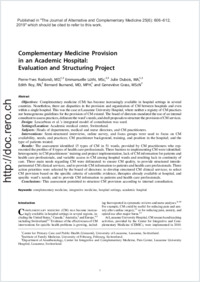Complementary medicine provision in an academic hospital: evaluation and structuring project
- Rodondi, Pierre-Yves Center for Primary Care and Public Health (Unisanté), University of Lausanne, Lausanne, Switzerland. - Institute of Family Medicine, University of Fribourg, Fribourg, Switzerland.
- Lüthi, Emmanuelle Institute of Family Medicine, University of Fribourg, Fribourg, Switzerland. - Department of Anesthesiology, Center for Integrative and Complementary Medicine, Pain Center, Lausanne University Hospital, Lausanne, Switzerland.
- Dubois, Julie Center for Primary Care and Public Health (Unisanté), University of Lausanne, Lausanne, Switzerland. - Institute of Family Medicine, University of Fribourg, Fribourg, Switzerland.
- Roy, Edith Center for Primary Care and Public Health (Unisanté), University of Lausanne, Lausanne, Switzerland.
- Burnand, Bernard Center for Primary Care and Public Health (Unisanté), University of Lausanne, Lausanne, Switzerland.
- Grass, Geneviève Center for Primary Care and Public Health (Unisanté), University of Lausanne, Lausanne, Switzerland.
-
23.05.2019
Published in:
- The Journal of Alternative and Complementary Medicine. - 2019, vol. 25, no. 6, p. 606–612
English
Objectives: Complementary medicine (CM) has become increasingly available in hospital settings in several countries. Nonetheless, there are disparities in the provision and organization of CM between hospitals and even within a single hospital. This was the case at Lausanne University Hospital, where neither a registry of CM practices nor homogeneous guidelines for the provision of CM existed. The board of directors mandated the use of an internal consultant to assess practices, delineate the ward's needs, and draft proposals to structure the provision of CM services.Design: Lescarbeau et al.'s integrated model of consultation was used.Settings/Location: Academic medical center, Switzerland.Subjects: Heads of departments, medical and nurse directors, and CM practitioners.Interventions: Semi-structured interviews, online survey, and focus groups were used to focus on CM availability, needs, and practices; CM practitioner background, training, and position in the hospital; and the type of patients treated.Results: The assessment identified 15 types of CM in 51 wards, provided by CM practitioners who represented the profiles of 8 types of health care professionals. Three barriers to implementing CM were identified: heterogeneity in CM practitioners' training and project implementation, lack of CM information for patients and health care professionals, and variable access to CM among hospital wards and resulting lack in continuity of care. Three main needs regarding CM were delineated: to ensure CM quality, to provide structured interdepartmental CM clinical services, and to provide CM information to patients and health care professionals. Three action priorities were selected by the board of directors: to develop structured CM clinical services; to select CM provision based on the specific criteria of scientific evidence, therapies already available at hospital, and specific ward's needs; and to provide CM information to patients and health care professionals.Conclusions: This assessment permitted to structure CM provision according to internal consultation.
- Faculty
- Faculté des sciences et de médecine
- Department
- Master en médecine
- Language
-
- English
- Classification
- Medicine
- License
-
License undefined
- Identifiers
-
- RERO DOC 328004
- DOI 10.1089/acm.2019.0062
- Persistent URL
- https://folia.unifr.ch/unifr/documents/308352
Statistics
Document views: 133
File downloads:
- pdf: 271
